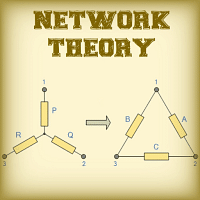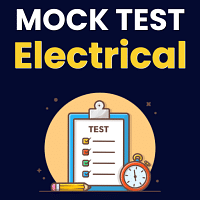Electrical Engineering (EE) Exam > Electrical Engineering (EE) Questions > Reluctance motora)is not a self starting moto...
Start Learning for Free
Reluctance motor
- a)is not a self starting motor
- b)starts as induction motor and runs assynchronous motor
- c)needs no d.c. excitation
- d)all above
Correct answer is option 'D'. Can you explain this answer?
| FREE This question is part of | Download PDF Attempt this Test |
Verified Answer
Reluctance motora)is not a self starting motorb)starts as induction mo...
A reluctance motor is a type of electric motor that induces non-permanent magnetic poles on the ferromagnetic rotor. The rotor does not have any windings. It generates torque through magnetic reluctance.
A. Reluctance motors are not self starting
B. Reluctance motors start as induction motor and runs as synchronous motors
C. Reluctance motors needs no DC excitation
A. Reluctance motors are not self starting
B. Reluctance motors start as induction motor and runs as synchronous motors
C. Reluctance motors needs no DC excitation
Most Upvoted Answer
Reluctance motora)is not a self starting motorb)starts as induction mo...
Reluctance motor is an electric motor that operates based on the principle of reluctance. It has a simple and robust construction and is used in various applications such as washing machines, vacuum cleaners, and other small appliances.
Self-starting motor
A self-starting motor is a motor that can start on its own without the need for an external force or assistance. However, reluctance motor is not a self-starting motor. It requires an external force to start the motor.
Induction motor
An induction motor is a type of motor that operates on the principle of electromagnetic induction. The reluctance motor starts as an induction motor and then runs as a synchronous motor.
Synchronous motor
A synchronous motor is a motor that operates at a constant speed with respect to the frequency of the power supply. The reluctance motor runs as a synchronous motor after starting as an induction motor.
DC excitation
The reluctance motor does not require DC excitation to operate. It operates based on the principle of reluctance, which means the motor generates torque due to the tendency of the rotor to align with the stator.
Conclusion
In conclusion, the reluctance motor is not a self-starting motor, starts as an induction motor, and runs as a synchronous motor. It does not require DC excitation to operate.
Self-starting motor
A self-starting motor is a motor that can start on its own without the need for an external force or assistance. However, reluctance motor is not a self-starting motor. It requires an external force to start the motor.
Induction motor
An induction motor is a type of motor that operates on the principle of electromagnetic induction. The reluctance motor starts as an induction motor and then runs as a synchronous motor.
Synchronous motor
A synchronous motor is a motor that operates at a constant speed with respect to the frequency of the power supply. The reluctance motor runs as a synchronous motor after starting as an induction motor.
DC excitation
The reluctance motor does not require DC excitation to operate. It operates based on the principle of reluctance, which means the motor generates torque due to the tendency of the rotor to align with the stator.
Conclusion
In conclusion, the reluctance motor is not a self-starting motor, starts as an induction motor, and runs as a synchronous motor. It does not require DC excitation to operate.
Attention Electrical Engineering (EE) Students!
To make sure you are not studying endlessly, EduRev has designed Electrical Engineering (EE) study material, with Structured Courses, Videos, & Test Series. Plus get personalized analysis, doubt solving and improvement plans to achieve a great score in Electrical Engineering (EE).

|
Explore Courses for Electrical Engineering (EE) exam
|

|
Reluctance motora)is not a self starting motorb)starts as induction motor and runs assynchronous motorc)needs no d.c. excitationd)all aboveCorrect answer is option 'D'. Can you explain this answer?
Question Description
Reluctance motora)is not a self starting motorb)starts as induction motor and runs assynchronous motorc)needs no d.c. excitationd)all aboveCorrect answer is option 'D'. Can you explain this answer? for Electrical Engineering (EE) 2024 is part of Electrical Engineering (EE) preparation. The Question and answers have been prepared according to the Electrical Engineering (EE) exam syllabus. Information about Reluctance motora)is not a self starting motorb)starts as induction motor and runs assynchronous motorc)needs no d.c. excitationd)all aboveCorrect answer is option 'D'. Can you explain this answer? covers all topics & solutions for Electrical Engineering (EE) 2024 Exam. Find important definitions, questions, meanings, examples, exercises and tests below for Reluctance motora)is not a self starting motorb)starts as induction motor and runs assynchronous motorc)needs no d.c. excitationd)all aboveCorrect answer is option 'D'. Can you explain this answer?.
Reluctance motora)is not a self starting motorb)starts as induction motor and runs assynchronous motorc)needs no d.c. excitationd)all aboveCorrect answer is option 'D'. Can you explain this answer? for Electrical Engineering (EE) 2024 is part of Electrical Engineering (EE) preparation. The Question and answers have been prepared according to the Electrical Engineering (EE) exam syllabus. Information about Reluctance motora)is not a self starting motorb)starts as induction motor and runs assynchronous motorc)needs no d.c. excitationd)all aboveCorrect answer is option 'D'. Can you explain this answer? covers all topics & solutions for Electrical Engineering (EE) 2024 Exam. Find important definitions, questions, meanings, examples, exercises and tests below for Reluctance motora)is not a self starting motorb)starts as induction motor and runs assynchronous motorc)needs no d.c. excitationd)all aboveCorrect answer is option 'D'. Can you explain this answer?.
Solutions for Reluctance motora)is not a self starting motorb)starts as induction motor and runs assynchronous motorc)needs no d.c. excitationd)all aboveCorrect answer is option 'D'. Can you explain this answer? in English & in Hindi are available as part of our courses for Electrical Engineering (EE).
Download more important topics, notes, lectures and mock test series for Electrical Engineering (EE) Exam by signing up for free.
Here you can find the meaning of Reluctance motora)is not a self starting motorb)starts as induction motor and runs assynchronous motorc)needs no d.c. excitationd)all aboveCorrect answer is option 'D'. Can you explain this answer? defined & explained in the simplest way possible. Besides giving the explanation of
Reluctance motora)is not a self starting motorb)starts as induction motor and runs assynchronous motorc)needs no d.c. excitationd)all aboveCorrect answer is option 'D'. Can you explain this answer?, a detailed solution for Reluctance motora)is not a self starting motorb)starts as induction motor and runs assynchronous motorc)needs no d.c. excitationd)all aboveCorrect answer is option 'D'. Can you explain this answer? has been provided alongside types of Reluctance motora)is not a self starting motorb)starts as induction motor and runs assynchronous motorc)needs no d.c. excitationd)all aboveCorrect answer is option 'D'. Can you explain this answer? theory, EduRev gives you an
ample number of questions to practice Reluctance motora)is not a self starting motorb)starts as induction motor and runs assynchronous motorc)needs no d.c. excitationd)all aboveCorrect answer is option 'D'. Can you explain this answer? tests, examples and also practice Electrical Engineering (EE) tests.

|
Explore Courses for Electrical Engineering (EE) exam
|

|
Suggested Free Tests
Signup for Free!
Signup to see your scores go up within 7 days! Learn & Practice with 1000+ FREE Notes, Videos & Tests.






















